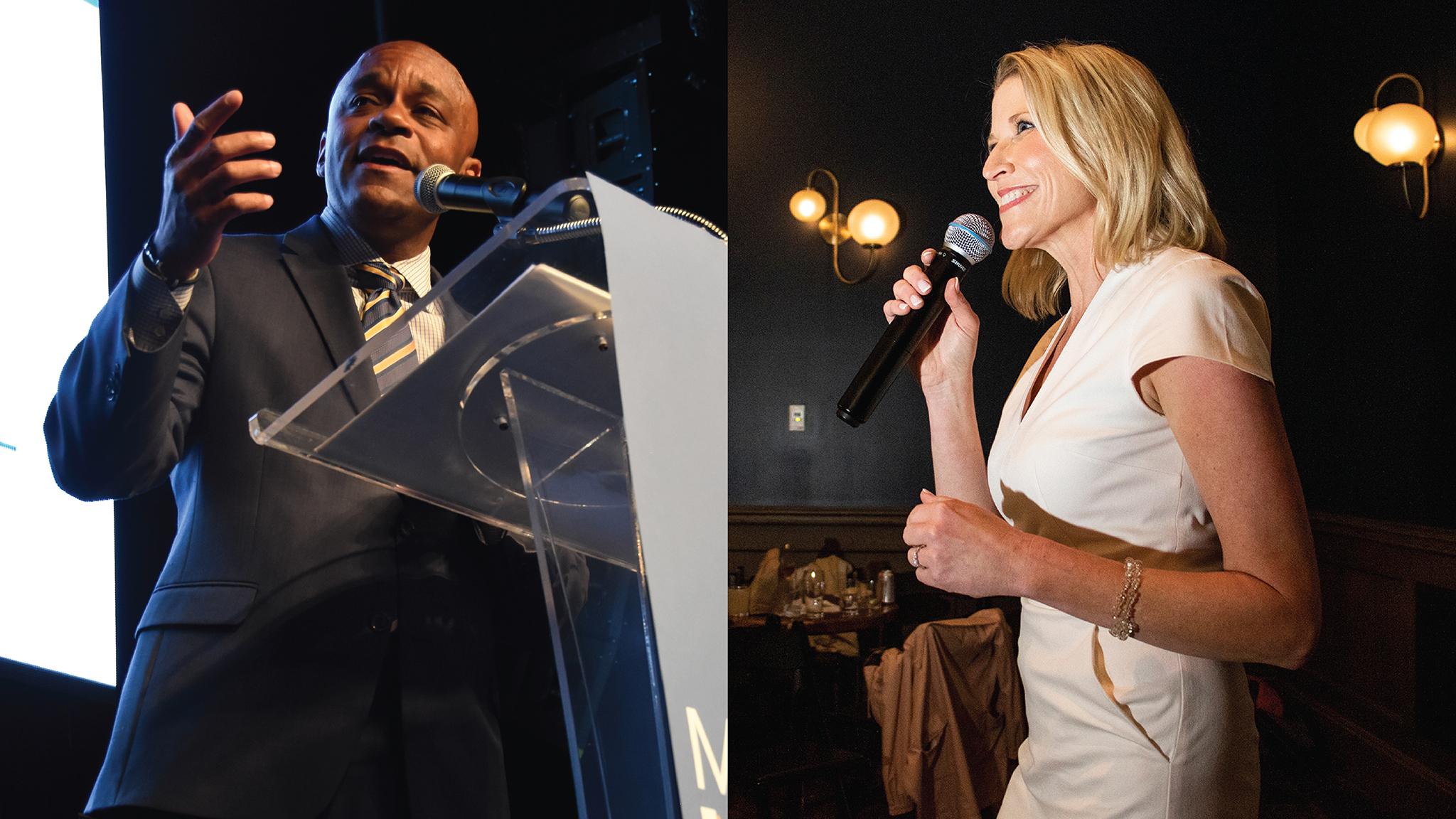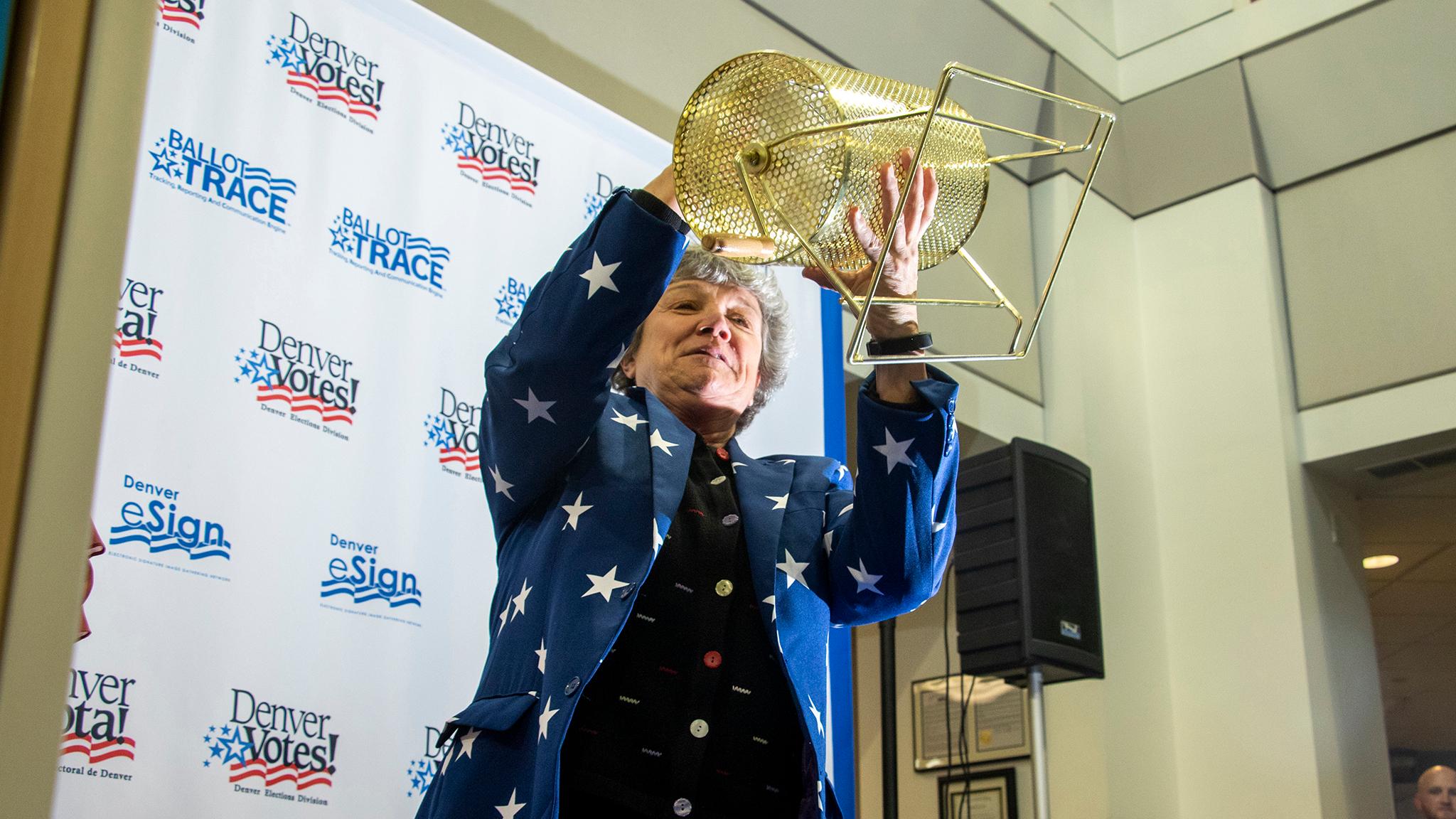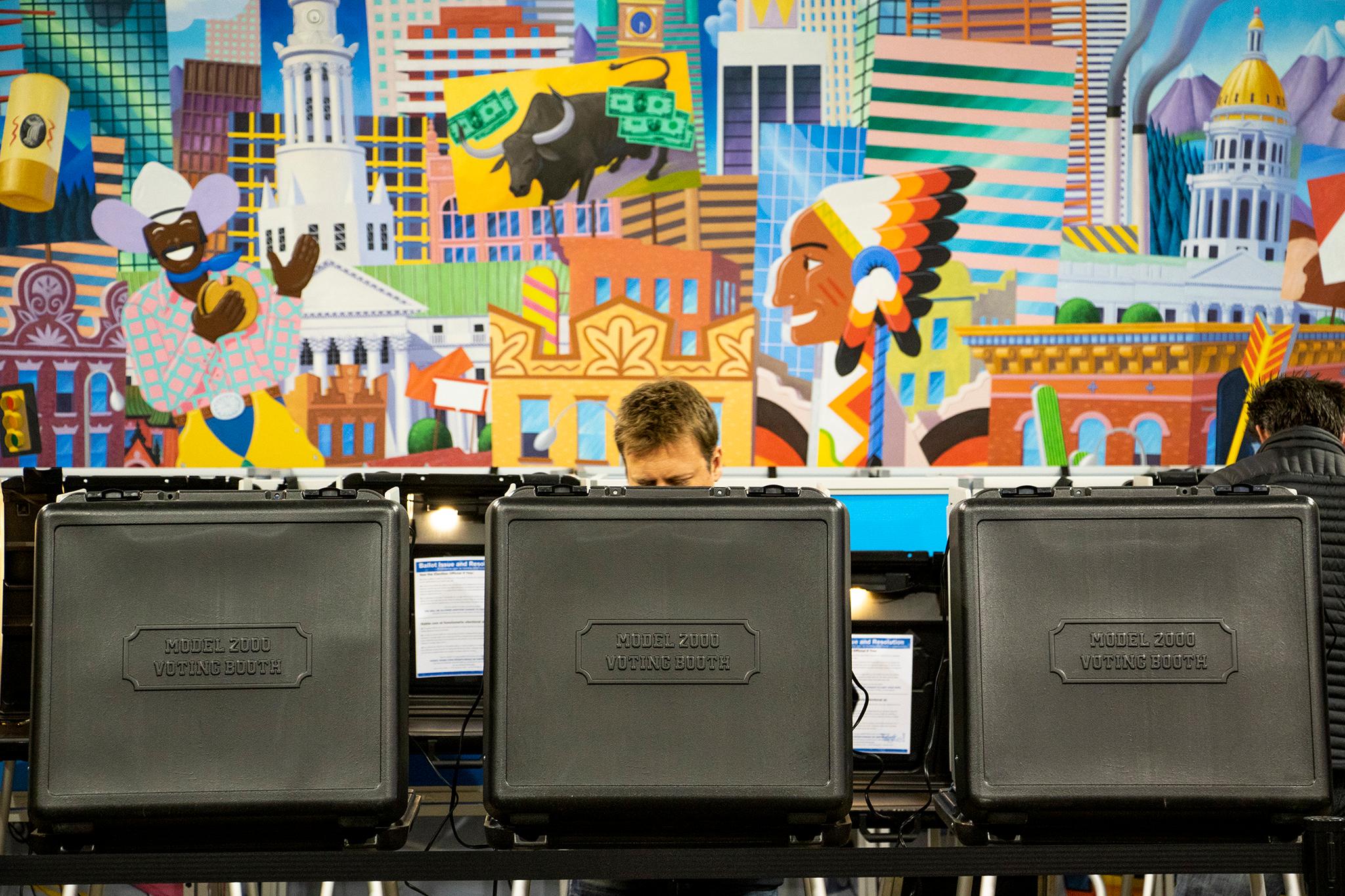Fire up the ol' thinking organ, it's civic engagement time.
No, you're not living a "Groundhog Day" moment. But yes, you've read those words before, in a Denverite ballot guide earlier this month. Denver just voted in a municipal election on May 7. But as you almost certainly know, we didn't resolve everything. There were a handful of races in which no candidate received more than 50 percent of the vote, which means we have to vote again in a runoff on June 4.
Here's what we need to decide on, again, and who's left:
Mayor: Michael Hancock and Jamie Giellis
Clerk and recorder: Paul López and Peg Perl
City Council District 1: Amanda Sandoval and Mike Somma
City Council District 3: Jamie Torres and Veronica Barela
City Council District 5: Amanda Sawyer and Mary Beth Susman
City Council District 9: Candi CdeBaca and Albus Brooks
City Council District 10: Wayne New and Chris Hinds
We also have a newcomer to this election cycle: Initiated Ordinance 302. It didn't have enough signatures to make it to the May 7 ballot, but it did make the cut for this one. Also known as the Let Denver Vote Initiative, it asks you to vote on whether we can vote on using city money for the Olympics.
As we said just a few weeks ago: Grab your ballot and get to it.
Don't have a ballot? That's OK. You can still get one, and you can even register to vote up until Election Day.
Mayor
Denver has a "mayor strong" government and the mayor has a little more power than in some other cities. For one thing, the mayor's office sets the city budget. For another thing, the mayor has power over the City Council, ultimately deciding whether or not the laws council creates actually become law.
Since Giellis and Hancock last squared off, both have homed in on their strategies.
Giellis extended an olive branch to former foes Lisa Calderón and Penfield Tate, whom she ran against in the general election, to form a "unity ticket." Her hope is to bring their voters over to her side the second time around. All three agree on repealing the urban camping ban, revising zoning processes to include more public input, reforming the Office of Economic Development to increase the number of minority- and women-owned businesses, and reforming the contract process for public projects, among other things.
Hancock and his supporters are betting on a higher turnout of transplants, his campaign has said, and other people who may not have voted the first time around. The incumbent is also boasting his experience as the city's top executive and manager of 11,000 employees while touting local and national endorsements from John Hickenlooper, Hillary Clinton, Pete Buttigieg and Wellington Webb.
Hancock has recently called out Giellis for her inability to remember what NAACP stood for and the resurfacing of a decades-old tweet in which she questions the point of Chinatowns, neighborhoods created as a result of racism against people from that nation.

Jamie Giellis: Jamie Giellis helped develop and lead the RiNo Art District, a branded geographic area in the River North section of Five Points that works with businesses to finance neighborhood improvements.
If elected, she would focus on housing, transportation, environmental sustainability and education, she told Denverite. Moving people more efficiently with transit and biking is another goal.
Michael Hancock (incumbent): Michael Hancock has presided over the city since 2011, so he's overseen several years of unprecedented growth and development. He's running for his third and final term.
Hancock, along with the city council, created Denver's first-ever affordable housing fund. Still, the mayor has quarterbacked the city during a period of increasing gentrification and displacement.
His administration has made the intersection of transportation and housing a priority on paper this year, releasing new plans for transit, land use, walking and parks under the banner of "Denveright."
Sexual texts sent by Hancock to a subordinate, Detective Leslie Branch-Wise, have scarred his tenure. He apologized after the news surfaced.
Denver City Council
Let's start by answering this question: What does Denver City Council do?
Denver has 13 city council people, and that's their full-time job. Eleven of them represent distinct districts divided by population. Two represent the entire city. Most members are Democrats, but the office is technically apolitical.
The City Council can:
- adopt or reject the budget;
- make laws;
- approve large contracts;
- dictate how land is used;
- adopt consequential plans;
- investigate government departments;
- and some other things.
So this is pretty important, too.
Five districts went to a runoff after the May 7 vote.
District 1

Amanda Sandoval: Sandoval is the legislative liaison and outreach program coordinator for the Denver Fire Department.
She wants to ensure new development weaves neatly into the existing neighborhood fabric by using more zoning overlays, expedite the permit and review process for developers who meet the minimum affordable housing requirements set by the city, and speed up the process for developers that go above those requirements.
Michael Somma: Somma is a lieutenant at the Denver Fire Department.
His biggest priorities are transportation and housing, and he's calling for a plan to address transit by introducing an electric streetcar system. To entice more developers to build affordable apartment units and starter homes, Somma would like to offer tax incentives. He's calling for more community input on such projects and provide more transitional services for folks trying to get into permanent housing.
District 3

Veronica Elizabeth Barela: Barela is a community organizer with four decades of experience in community development.
She wants to improve the city's housing stock, curb gentrification in the district, push for developers to include more affordable housing units in their buildings and educate more people about homeownership, which she thinks could help people in the district avoid selling their homes.
Jamie Torres: Torres is Deputy Director of the Agency for Human Rights & Community Partnerships and Director of the Office of Immigrant & Refugee Affairs.
She wants to keep current residents in place and ensure current district residents benefit from things like the recreation center in the works once it's completed.
She will push for more investment in affordable housing and renter protection while looking for a middle-ground on development while helping people find better jobs will be another focus.
District 5

Amanda Sawyer: Sawyer, who moved to Denver in 2016, hopes to decelerate development while giving residents more control over the process. She aims to accelerate transit development to manage growth by, well, funding it.
A singular event sparked Sawyer's decision to run: The attempt by homeowners to build a cache of 27 zero-emissions, middle-income condos in Hilltop known as the Green Flats.
Mary Beth Susman (incumbent): Susman has served for eight years. She wants four more to address the housing shortage with more homes in more places, including traditionally single-family housing neighborhoods.
She's also a longtime advocate for sustainable transport -- walking, biking, buses and trains -- and says she would fund those things to curb Denver's car addiction.
District 9

Albus Brooks (incumbent): Brooks, who has twice beaten cancer, often calls himself an "urbanist." He created affordable housing incentives for developers near transit and helped establish the city's first affordable housing fund.
If re-elected, Brooks will ask voters for funding sources to prevent homelessness and work to add shelter space, he said, and ask the mayor to open up rec centers and religious institutions for overflow.
Candi CdeBaca: CdeBaca is a fixture in District 9 because she's lived in Swansea most of her life. She led the fight against CDOT's I-70 expansion and runs Project Voyce, an organization dedicated to engaging kids in civic life.
She wants some of the same things as Brooks -- walkable, transit-rich neighborhoods and more services for people without homes -- but doesn't agree on how to get there.
District 10

Chris Hinds: Hinds lives in North Capitol Hill, aka Uptown, and thinks his housing and transportation platform will appeal to voters.
In his mind, every place in a neighborhood should be a maximum 20-minute walk, roll, bike ride or transit ride away, so Hinds said he would advocate for the city to take responsibility for public sidewalks, like it does with roads, while funding sustainable transportation options to create 20-minute neighborhoods.
He wants to tackle the housing shortage by allowing duplexes and fourplexes in traditionally single-family neighborhoods in order to add density without changing a neighborhood's character.
Wayne New (incumbent): With one term behind him, New says his experience as an elected official combines with is 30-plus years running hospitals to qualify him for four more years.
If re-elected, New says he will tackle homelessness by giving more resources to centers for people experiencing homelessness, like the one recently approved for Sunnyside, where people without homes could get support beyond a roof -- like for mental health.
He would also float an impact fee on developers to raise money for affordable housing and other needs.
Clerk and recorder
This job is pretty administrative. The office oversees elections, issues marriage licenses and other records, and serves as a public trustee for the city.
Current Clerk and Recorder Deborah Johnson announced in 2017 that she wouldn't seek reelection. It was just 10 years before that Denver voters decided to make the position an elected one rather than an appointed one. Whoever is chosen in this election will be just the third person elected to the office.

Who's running:
Paul Lopez: The current District 3 councilman is term-limited, but he's hoping to stick around city hall.
Empowering more Denver voters will be among his biggest goals. To improve voter turnout, he wants to increase the number of 24-hour drop boxes in the city. But in addition to the public spaces they're currently in, he wants to include them in areas like grocery stores, carnicerias, cafés.
"Peg" Margaret Perl: An attorney by trade, Perl previously worked in political and campaign finance consulting and in the U.S. House Ethics Committee. She believes her work at the federal level -- making recommendations on campaign finance regulations, advising on compliance for certain programs -- is part of what her responsibilities at the city and county level will include.
She's worked at the state level as well on issues she believes are pertinent to local races. Perl helped write the Voter Access and Modernized Elections Act of 2013, which among its provisions includes mandating mail ballots for registered voters.
She also wants to centralize all public records to make it easier for residents to look at things like financial disclosure forms, and she wants to improve voter engagement by giving people more access to voting centers and drop boxes.
Initiative 302
The Let Denver Vote Initiative would let Denver vote on whether the city can spend money to lure and host the Games.
The vote would get triggered if and when politicians decide they want to spend public money or offer incentives to bring the Olympics to Colorado.
This is the official ballot language: Shall the voters of the City and County of Denver enact a measure prohibiting the use of public monies, resources, or fiscal guarantees in connection with any future Olympic Games, without the City first obtaining voter approval at a regularly scheduled municipal election or special election should the City decide to use public monies, resources, or guarantees for this purpose?












